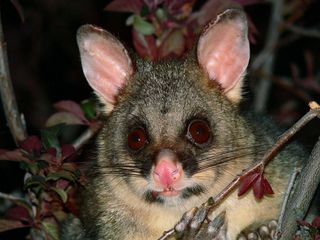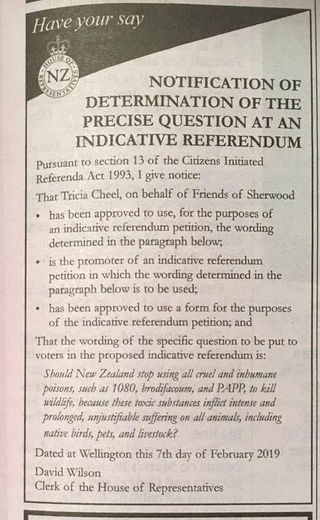Forgiveness
New Zealand Continues to Have Major Animal Welfare Issues
A growing number of people are very concerned about their war on wildlife.
Posted March 30, 2019
New Zealand continues to have major animal welfare issues. A growing number of people are extremely concerned with their war on wildlife, the goal of which is to kill all invasive "pests," including rats, possums, stoats, and other invasive animals, by 2050, using the horrific poison 1080, which also kills numerous non-target animals along with other brutal methods, including trapping, snaring, shooting, and possum stomping. In addition to adults taking part in this widespread massacre, youngsters also are being trained to harm and to kill non-native animals in school-sanctioned programs. And it should be noted that, as of May 2015, New Zealand declared all animals to be sentient beings and continues to rank among countries with the highest levels of domestic violence. (Click here for detailed data.) I've listed a number of essays in the reference section that deal with what's happening in a place that many people call "a country of peaceful people."

There truly are many serious animal welfare issues in New Zealand. Here are a few of the many emails I've received over the past few years.
"Every 1080 drop in deer country kills nearly all deer. They drop baits in lines like a feedlot. I witnessed it at Taupo with Clyde Graf in 2016. We saw 12 dead deer after a drop. Mostly stags. In one acre of bush. The farmer’s son was born with poor eyes and testicular abnormalities, and neurological issues consistent with 1080 exposure by unborn fetus. Similar issues with his cattle. His wife had breast cancer. Over 40 years, all kiwi vanished from forest with 1080 use. He lost 8 dogs to the poison and bulls. We saw one native bird in the silent forest."
In this note I was referred to a video called "Deep Mass-Poisoned — Lake Taupo Farmer Speaks Out."
In another email, I was told: "We are all so disgusted, it is such an inhumane way for any animal to die, plus we have a lot of hunters here in NZ that could have actually gone in and used the resource. Personally I think that it will take someone like yourself or someone from out of New Zealand to make a huge fuss about the whole thing that the Govt will have to put an end to it. I just wanted to make you aware of what is still happening here even now with this cruel, inhumane, and very toxic poison being dumped all over our land. This year, they are planning on dropping even more; it is killing our country, our forests and birds and other things are dying."
Another note read: "It is horrific to teach children to kill, and even more horrific that anyone would drown animals. I was born here and had a baby possum when I was a child whose mother was hit by a car, and he was the sweetest thing, absolutely adorable. I think people should let nature work things out. After all, it was because of humans that we have possums in NZ, and they are just living their lives where they were born, the same as us."

In another email I was told about a referendum to end the use of all poisons to kill animals, and another person alerted me to two essays. The first is titled "OSPRI FINALLY ADMITS IT KILLED 92 PERCENT OF MOLESWORTH STN’S DEER IN 2017 WITH 1080 POISON INTENDED FOR POSSUMS (AN ESTIMATED 4,000 DEER)," and the second is called "Plan to feed tahr to kea to protect them from 1080 drop," in which we read, "Three hundred tahr are to be culled and fed to kea in an attempt to keep the endangered native parrots away from an aerial 1080 poison drop in the hills behind Whataroa. Zero Invasive Predators (Zip) was last month granted permission from the Department of Conservation for intensive predator control in an attempt to eradicate possums and, potentially, rats, from about 12,000ha of rugged backcountry at the Perth River."
And one note I received noted that when people say it's okay to kill other animals and apologize for doing it "humanely" — killing with kindness, some call it — it sickens her. Her email led me to write an essay called "The 'It's OK to Kill Animals Humanely' Apology Doesn't Work." The woman who wrote it said that she could sort of understand why many people want to humanely kill the non-native animals, but that she was 100 percent against it, citing ethics and biologists who warned it wouldn't work: 1080 and other poisons clearly are barbaric and inhumane.
“Killing with kindness,“ a phrase put forth by Nicola Toki, the Threatened Species Ambassador of New Zealand’s Department of Conservation (DoC), is a misleading and troublesome oxymoron that covers up the hate and violence with which possums and other animals are vilified as “the enemy,” and the language of war, hate, violence, and bullying used by many supporters of New Zealand's war on wildlife is appalling. There is nothing humane, compassionate, or kind when non-human animals (animals) are killed by ingesting 1080 or another poison, or trapped, shot, or stomped. It’s also important to ask, “Where have many animal welfare and conservation groups gone?” Many have abandoned highly sentient beings who will deeply suffer and die in New Zealand’s war “in the name of conservation.” (See "Does Everybody Really Hate Possums? The Bandwagon Effect.")
The last sentence of Ms. Toki’s essay shows how vacuous claims about killing with kindness can be. She writes, “The key to getting it right is to hold onto empathy for other living things along the way.” So, killing other animals is just fine, as long as the killers feel for the animals they’re slaughtering. I can imagine some people saying or thinking something like, “I know I’m causing you pain as I kill you, but please understand I’m doing it with kindness, because it has to be done.” Of course, the animals who are killed couldn’t care less about how their one and only life is taken.
“Killing with kindness” is neither the panacea nor is it an acceptable excuse for slaughtering other animals. And using the poison 1080 completely removes any iota of kindness from the equation. Being poisoned with 1080 makes for a horrific way to die, plain and simple. So, let's stop the meaningless babble about "killing with kindness." Some interesting speculations about why people come to hate other animals can be found here.
I also receive emails from people who are seriously concerned with the link between violence toward non-humans and violence toward humans. (See "Long-Term Effects of Violence Toward Animals by Youngsters.")
What can people do to call attention to New Zealand's war on wildlife?
"This logic [of killing] is so entrenched in New Zealander’s psyches that very few dare to question it."
"It's time to call out New Zealand’s war on wildlife firmly, but nicely. 'Killing with kindness' is an oxymoron, the language of hate appalling, and where have welfare and conservation groups gone?"
Many people are asking what they can do to end this brutal, country-wide slaughter. My simple advice is to write about it and use all possible public media — radio, TV, newspapers, and magazines — to spread the word. Many feel, as one woman put it, "I'm all alone in a massive effort to kill all invasive animals," and I assure them they're not. And not all youngsters want to be turned into animal killers or to be inhumanely educated to kill so-call "pests" or to be turned into killing addicts. (See "Why Is It Wrong to Not Want to Kill Animals?"; "New Zealand Kids Get Into Killing Animals and Love Doing It"; "Violence Toward Animals: 'Can You Please Help My Daughter?'"; and "Killing Animals Is 'Weirdly Addictive' Says New Zealander.") Some people ask me what's being done by animal local welfare/conservation organizations, and I let them know that SAFE For Animals, New Zealand and the New Zealand SPCA are opposed to the use of 1080, and they should feel free to contact these groups.
I also tell them about other people who have written to me and ask them to keep in mind what Gretchen Wyler aptly said: "Cruelty can't stand the spotlight." I also remind them that many people who are against the mass killings, researchers included, are not arguing that there isn't a "problem" nor are they denying the effects of non-native animals, but rather they're arguing that killing simply is morally wrong, and it won't work.
Conservation psychologists, anthrozoologists, humane educators, and compassionate conservationists could truly help people who want to end the killing. There are many lessons to be learned from following the basic tenets of the rapidly growing international and interdisciplinary field called compassionate conservation. These are “First do no harm,” and the life of every individual matters. Many who believe that what they’re doing is right, including educators and scientists, are willing to allow youngsters to carry the killing torch into the future to develop a culture of killing so that certain animals, their children, and other descendants for whom violent hatred prevails will continue to be slaughtered, because they’re the enemy. This is ethically repugnant.
I hope all people who are against the war on wildlife will speak out, endure the slurs, bullying, vulgar messages, and other criticisms that are casually and not so casually thrown their way, and speak their minds and hearts. An extremely serious animal welfare crisis continues to plague New Zealand, and It surprises me that many people in New Zealand and elsewhere don't know what's happening down there. However, when they learn about it, they're appalled. It's also clear that New Zealand's declaration that non-humans are sentient beings is at best vacuous, a meaningless "feel-good" move.
Stay tuned for future updates on the state of animals in New Zealand and elsewhere. Currently, it's looking pretty dismal down there. It's never too late to work on behalf of other animals, and there's always more to do.
References
Accusations of "Invasive Species Denialism" Are Flawed
Why Is It Wrong to Not Want to Kill Animals?
What if New Zealand's War on Wildlife Included Primates?
The "It's OK to Kill Animals Humanely" Apology Doesn't Work
New Zealand Kids Get Into Killing Animals and Love Doing It
Killing Animals Is "Weirdly Addictive" Says New Zealander
It's a Ghastly Time to Be a Bunny in New Zealand
Teaching New Zealand Kids to Kill Animals Is Very Worrisome
Youngsters Encouraged to Kill Possum Joeys in New Zealand
New Zealand Kids Kill Possums for Fun and Games
Long-Term Effects of Violence Toward Animals by Youngsters
Violence Toward Animals: "Can You Please Help My Daughter?"
Does Everybody Really Hate Possums? The Bandwagon Effect
New Zealand’s “Possum Stomp” vs. Compassionate Conservation, Individual Well-Being, and Ethics




